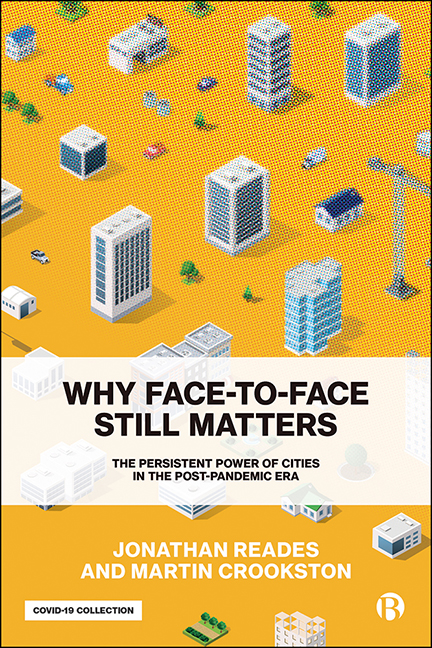5 - Talking Shop
Published online by Cambridge University Press: 04 January 2022
Summary
… and hear poor rogues
Talk of court news; and we’ll talk with them too
Who loses, and who wins; who's in, who's out;
And take upon's the mystery of things
William Shakespeare, King Lear, 1623We have, so far, been looking at how face-to-face contact sits within the systems and markets of the modern city. Our way of thinking about businesses, places and the world of ICT has suggested a series of ‘layers’ which structure how the 21st-century economy works. The networks (essentially Chapter 2's transport and communications networks) provide a basic substrate which markets load with potential, and the deals (Chapter 4) are how businesses release that potential, transaction by transaction. But the business choices, and company dynamics, that we have been discussing are embedded in an underlying human reality. Contact clearly matters because it improves deal quality and helps to manage transaction costs, and so, even in a world of faster and higherquality information technology, people seem to attach an especially high value to face-to-face interaction.
Beyond the management of uncertainty – a fairly abstract construct, it has to be said – what is it that they value about meeting up when it's so expensive to do in terms of both time and money? This chapter explores that ‘people’ dimension: we look first at the nature of face-toface contact – what it consists of and what seems to matter most – and then we link this to the importance of central places as a locus of faceto-face contact.
Our human need for contact
Being social is Good For You: Susan Pinker's studies of life in the Sardinian hilltop villages, where ten times as many men live to over 100 as elsewhere, showed the importance of the ‘human touch’: ‘Every centenarian we met was supported by kith and kin, visitors who stopped by to chat, bring food and gossip, provide personal care, a kiss on the cheek.’ So it's good for us in a personal sense. And that's true of the work environment, too: all other things being equal, we tend to prefer working somewhere with a social dimension.
But context always matters: it's clear that villages are great places to be supported and cared for in our dotage, but for young people they can also be socially, economically and culturally stifling.
- Type
- Chapter
- Information
- Why Face-to-Face Still MattersThe Persistent Power of Cities in the Post-Pandemic Era, pp. 91 - 120Publisher: Bristol University PressPrint publication year: 2021



